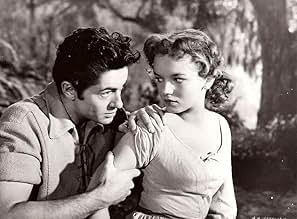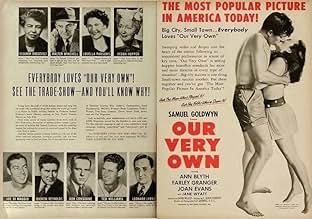Gail discovers the shocking news that she is adopted during a heated argument with her sister, Joan. With the reluctant support of her adoptive parents and baby sister, Penny, Gail goes in s... Read allGail discovers the shocking news that she is adopted during a heated argument with her sister, Joan. With the reluctant support of her adoptive parents and baby sister, Penny, Gail goes in search of her biological mother and true identity.Gail discovers the shocking news that she is adopted during a heated argument with her sister, Joan. With the reluctant support of her adoptive parents and baby sister, Penny, Gail goes in search of her biological mother and true identity.
- Nominated for 1 Oscar
- 3 nominations total
- Gwendolyn
- (as Rita Hamilton)
- Poker Player
- (uncredited)
- Poker Player
- (uncredited)
- Boy at Birthday Party
- (uncredited)
- Card Player
- (uncredited)
- Student
- (uncredited)
- Director
- Writer
- All cast & crew
- Production, box office & more at IMDbPro
Featured reviews
Real mother Ann Dvorak (as Gert) has a hard life. Father Donald Cook (as Fred) smacks his girls with an open palm. Mouthy littlest daughter Natalie Wood (as Penny) annoys the heck out of genuinely funny Gus Schilling (as Frank) when he installs the family's new TV set. Fresh-faced teenager Martin Milner has the best up-and-coming role and adoring family servant Jesse Grayson dons her maid uniform for the last time. "Our Very Own" is a slickly produced melodrama which suggests that Samuel Goldwyn, if he were born 50 years later, would have been very successful in 1950s television.
****** Our Very Own (7/27/50) David Miller ~ Ann Blyth, Farley Granger, Joan Evans, Jane Wyatt
Despite obvious sincerity, the film's Hollywood treatment guarantees a predictable ending from the very start. I just wish the screenplay had dealt with the more difficult aspect of adoption—namely, the factor of an unknown genetic inheritance among those contemplating marriage and who care about such things. And that could well apply to an upwardly mobile neighborhood such as the Macaulay's. But including a genetic factor would have resulted in a much more difficult and darker film.
Still, it's an entertaining movie despite the compromises. That opening sequence is a gem of youthful high-spirits and frustration thanks to Natalie Wood and Gus Schilling even if he is doing schtick (as one reviewer noted). The scene is not just a good one, but also aims to persuade us that the Macaulay's are a real family like anyone else's. Anyway, I agree with those reviewers who find Blythe and Granger a little long-in-the-tooth to be playing teenagers, though it's one of the movie's lesser compromises. Yes, Ann Dvorak is good as the self-conscious birth mother. But I really like Joan Evans' turn as the jealous sister. Catch her subtle facial expressions as she goes through any one of her many emotional conflicts— a fine, unheralded young actress. Also standout is young Martin Milner. His totally unaffected teenager seems light years from his high school peer, the maturely sophisticated Blythe.
And speaking of Milner's gawky teen, I can't help noticing the chuckles we get from his rather callous treatment of pudgy, plain-Jane Gwendolyn (Rita Hamilton). For a film otherwise sensitive within its limits, that same concern apparently doesn't extend to an unattractive girl made the butt of mood lightening gags in a seemingly guilt-free manner. I'm not sure what the moral is, but I don't think it's a good one. Anyway, the movie remains an interesting, if idealized, time capsule of a period when apparently every teenage boy owned a hotrod.
One scene stands out in my mind and I don't think I'm giving much away in retelling it: after Blyth discovers she was adopted she asks the family maid Violet - played by Jessica Grayson in another memorable performance - if she knew. Violet answers "Honey I was here when they brought you 18 years ago". Grayson delivered it with just the right amount of sensitivity to underscore to us and the deeply wounded Blyth that the circumstances of her birth had no effect on her status within the family. There were many more such vignettes, when Blyth returns at 3am and gets yelled at by her father, when Blyth and Wyatt get tangled up in the meaning of the word "mother" the morning after the revelation, the look of fear on Wyatt's face when she allows her second daughter to look for her birth certificate. They showed us a strong, caring family, with patient, intelligent and understanding parents capable of mistakes they were not afraid to admit and tackle. Nobody was all good or all bad, just people with a full range of human strengths and frailties, people like you and me.
I could go on like this forever and give away the whole plot but I'll stop here and close with another memorable scene I feel rounds out this movie. It takes place before Blyth discovers she's adopted, on the beach with Farley Granger. They come out of the surf, draw close and Blyth reaches up on her tiptoes to kiss Granger. The camera draws away and looks down on them from high up as the waves approach them from both sides to merge where they stand. There was a raw sensuality to this scene. It was full of the passion that complements altruistic love.
Did you know
- TriviaFilm debuts of Kipp Hamilton (as Rita Hamilton) and Phyllis Kirk.
- GoofsMrs. Macaulay tells Joan her birth certificate is in a "sealed" box. There is a lock on the box, but Joan opens it without a key. Her mother never mentions needing a key. There is a very good reason that box should have been locked. Mr. Macaulay produces a key later and locks the box.
- Quotes
Penny Macaulay: [about Chuck] He really is awfully cute, isn't he?
Joan Macaulay: [feigning ignorance] Who?
Penny Macaulay: [exasperated] President Truman!
- ConnectionsReferenced in La marche à l'enfer (1950)
- How long is Our Very Own?Powered by Alexa
Details
- Runtime
- 1h 33m(93 min)
- Color
- Aspect ratio
- 1.37 : 1
























